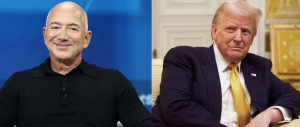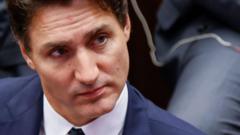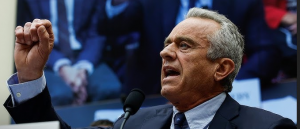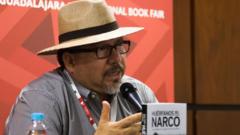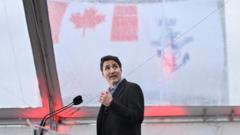Trump’s jest about Canadian Prime Minister Justin Trudeau's status as “Governor” reopens the conversation on U.S.-Canada trade relations while raising important questions about tariffs and their impact on consumers and economies. Canadian leaders respond with concerns over proposed tariffs and the interconnectedness of the two nations.
Trump’s Playful Proposals on U.S.-Canada Trade Relations Spark Controversy
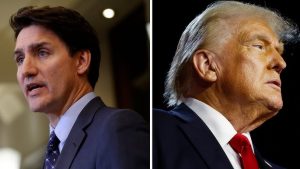
Trump’s Playful Proposals on U.S.-Canada Trade Relations Spark Controversy
Former President Donald Trump humorously suggests annexation of Canada in a recent post regarding trade tariffs, igniting a lively debate on U.S.-Canada relations.
Former President Donald Trump recently reignited discussions about U.S.-Canada trade relations with his trademark blend of humor and policy-driven commentary. In a post on Truth Social, Trump playfully referred to Canadian Prime Minister Justin Trudeau as the “Governor of the Great State of Canada,” humorously suggesting that annexation could be considered if Canada's economy falters under proposed America-first tariffs. “It was a pleasure to have dinner the other night with Governor Justin Trudeau of the Great State of Canada,” he wrote. “I look forward to seeing the Governor again soon so that we may continue our in-depth talks on tariffs and trade, the results of which will be truly spectacular for all!”
This light-hearted jab plays into a long-standing trade debate between the neighboring countries. During Trudeau's recent visit to Mar-a-Lago, Trump highlighted his commitment to imposing tariffs unless Canada and Mexico implemented more significant measures to address the flow of illegal drugs and migrants into the United States. While much focus is typically placed on issues at the southern border, the Canadian border has also seen substantial drug smuggling attempts. Last fiscal year alone, at least 43 pounds of fentanyl were seized at the northern border, compared to over 21,000 pounds at the southern border.
Canadian leaders have expressed annoyance at being paired with Mexico in these discussions. They contend that Canada’s contributions to U.S. trade and energy security should not be underestimated. “Trump got elected on a commitment to make life better and more affordable for Americans,” Trudeau asserted. “I think people south of the border are beginning to wake up to the real reality that tariffs on everything from Canada would make life a lot more expensive.”
Kristen Hillman, Canada’s ambassador to the U.S., tackled the concerns, highlighting the unique dynamics of the U.S.-Canada trade relationship. “We are one-tenth the size of the United States, so a balanced trade deal would mean per capita we are buying 10 times more from the U.S. than they are buying from us,” Hillman explained, stressing the importance of context. She also pointed out that Canada remains a vital energy partner, with $170 billion in energy exports to the U.S. last year. Approximately 77% of all Canadian exports are directed toward the United States, emphasizing the intertwined nature of their economies.
Despite the ongoing tensions around tariffs and trade policy, Trump’s playful tone kept the dialogue engaging. In a follow-up post, he shared an AI-generated image of himself holding a Canadian flag, humorously captioned, “Oh, Canada!” This playful approach illustrates Trump's ability to blend humor with serious policy discussions, leaving Americans and Canadians alike to reflect on the implications of his statements.

